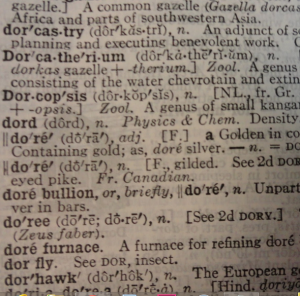What does ‘dord’ mean?
 Well, it was in the dictionary but nevertheless, ‘dord’ means nothing. I don’t mean by this that it means ‘nil’ or that it means ‘zero’ – it simply isn’t a word.
Well, it was in the dictionary but nevertheless, ‘dord’ means nothing. I don’t mean by this that it means ‘nil’ or that it means ‘zero’ – it simply isn’t a word.
No such word exists.
So why was it in Webster’s Dictionary for five years? And what’s more, how did a non-existent word get in there in the first place?
It must be a pretty tricky proposition, creating a dictionary. Human error can always creep in. And ‘dord’ is a case in point. What happened was that in 1934, the Webster company’s chemistry specialist sent in a detail to be included in the dictionary.
At that time, dictionaries included abbreviations in the main listings.
Later, abbreviations were put in their own section but until that time, abbreviations such as ‘lb’ or ‘oz’ were in the main body of the book.
The chemistry specialist intended to inform the typesetters that the letter d could be an abbreviation for the word ‘density’. This was the case if it was either upper or lower case.
Hence the note he sent in read ‘D or d, cont./density’.
This was translated as meaning that the word ‘dord’ meant ‘density’. Somewhere along the line, someone bunged in a guide to help people pronounce the word as you can see in the image above – (dôrd) – then added the ‘fact’ that it was a noun and therefore the word was included in the dictionary. And no-one noticed. It does make you wonder how many people were going around in the nineteen-thirties using the word.
A smart schoolkid could look it up in the dictionary and include it in his schoolwork. The teacher would probably scratch his or her head and check the word themselves. Yep, there it is in Webster’s – the kid must be a genius.
Now, ‘etymology’ is a wonderful word (and not to be confused with ‘entomology’ which is the biological study of insects). It refers to this history or provenance (another rather cool word) of words themselves. In 1939, when the word dord had been in the dictionary for five years, an editor noticed that ‘dord’ had no etymology. You can see in the image above that other words have brief explanations after them, such as [Fr] indicating that the word came from the French. But ‘dord’ had none. He investigated and discovered the truth.
Isn’t that a cool little story?
ABOUT THE AUTHOR



